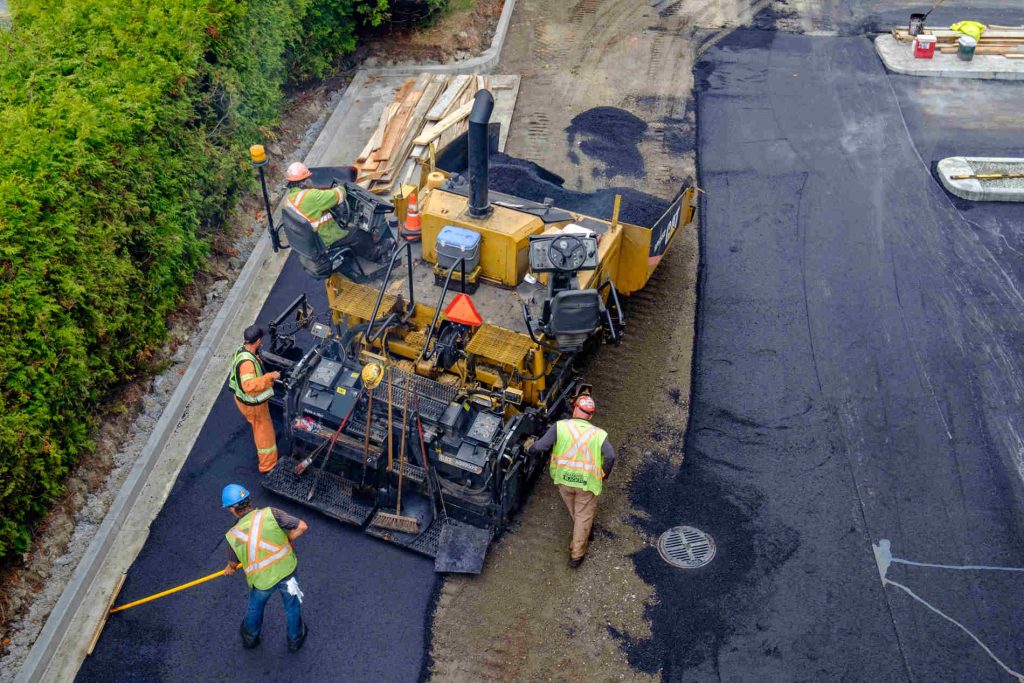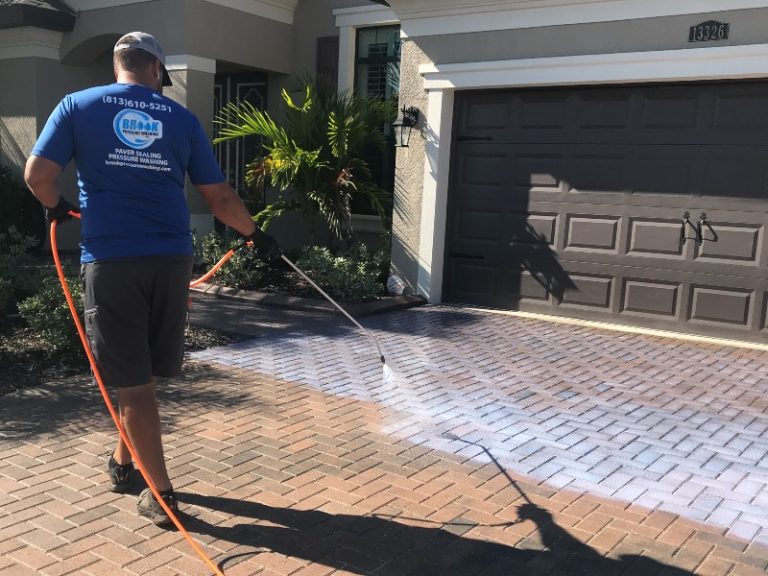Asphalt Paving Contractors Your Guide to Choosing the Best
Asphalt paving contractors play a crucial role in transforming surfaces, from residential driveways to extensive commercial parking lots and road repairs. Choosing the right contractor ensures a successful project, from initial planning to final execution. This guide delves into the essential aspects of selecting and working with asphalt paving contractors, offering insights into services, contractor evaluation, project management, and more.
Understanding the diverse range of asphalt paving services is key. Contractors handle everything from simple resurfacing to complex road reconstruction. This overview will highlight the services offered, common projects, the steps involved in a typical project, and crucial cost and timeline comparisons. This detailed look will help you navigate the process with confidence.
Asphalt Paving Services Overview

Asphalt paving contractors offer a range of services crucial for maintaining and improving roadways, parking areas, and driveways. These services encompass various stages of the paving process, from initial preparation to final finishing. This overview details the scope of these services, providing examples and insights into project specifics.
Types of Asphalt Paving Services
Contractors typically provide a comprehensive suite of asphalt paving services, including but not limited to: asphalt installation, repairs, and maintenance. Asphalt installation encompasses the complete process from site preparation to final surfacing. Repairs address damaged or deteriorated sections, while maintenance encompasses routine upkeep to extend the lifespan of existing asphalt surfaces.
Common Asphalt Paving Projects
Asphalt paving projects span diverse applications, from residential to commercial sectors. Residential driveways often involve resurfacing or new installations. Commercial parking lots require meticulous planning and execution, often including specialized drainage systems and load-bearing considerations. Road repairs, crucial for public safety and infrastructure, involve addressing potholes, cracks, and other pavement deterioration.
Steps in a Typical Asphalt Paving Project
A typical asphalt paving project involves a series of well-defined steps, each critical to the future. These steps typically include site preparation, subgrade improvement, base course construction, asphalt paving, and finishing. Site preparation involves clearing the area, removing debris, and ensuring proper drainage. Subgrade improvement addresses the underlying soil structure for stability. Base course construction provides a solid foundation for the asphalt layer. Asphalt paving involves the laying of the asphalt material. Finally, finishing ensures a smooth and even surface.
Cost and Timeline Comparison of Asphalt Paving Projects
The costs and timelines of asphalt paving projects vary considerably based on the project scope and complexity. The following table provides a general comparison of costs and timelines for different project types:
| Project Type | Estimated Cost (USD) | Estimated Timeline (Days) |
|---|---|---|
| Residential Driveway Resurfacing (200 sq ft) | $3,000 – $5,000 | 2-3 |
| Commercial Parking Lot Resurfacing (10,000 sq ft) | $20,000 – $50,000 | 5-7 |
| Road Repair (1000 sq ft) | $5,000 – $15,000 | 3-5 |
Note: Costs and timelines are estimates and can vary significantly based on factors like material costs, labor rates, site conditions, and project complexity.
Contractor Selection and Evaluation: Asphalt Paving Contractors

Choosing the right asphalt paving contractor is crucial for a successful project. A poorly selected contractor can lead to costly rework, delays, and ultimately, a less than satisfactory final product. Careful evaluation of potential contractors is essential to ensure quality work and a smooth project timeline.
Selecting a reputable and experienced asphalt paving contractor involves a multi-faceted approach. This process considers factors ranging from the contractor’s past performance to their financial stability and adherence to industry standards. Thorough due diligence during the selection process is key to mitigating potential risks and maximizing project outcomes.
Factors to Consider When Choosing a Contractor, Asphalt Paving Contractors
Evaluating potential contractors involves assessing several critical factors. These include their experience level, their financial stability, and their demonstrated commitment to safety and quality. The contractor’s understanding of local regulations and their ability to manage projects efficiently are also significant considerations. A detailed understanding of these factors will significantly improve the likelihood of a positive project outcome.
- Experience: Assess the contractor’s years of experience in asphalt paving, their track record of successful projects, and the types of projects they’ve undertaken. Look for contractors with a proven history of delivering high-quality work within budget and on schedule.
- Financial Stability: Verify the contractor’s financial stability and ensure they are a reputable and established company. Consider their payment history, insurance coverage, and bonding capabilities. This information helps to ensure the contractor can complete the project without financial difficulties.
- Reputation and References: Investigate the contractor’s reputation through online reviews, industry forums, and word-of-mouth recommendations. Request references from previous clients and verify their feedback through direct communication. A strong reputation suggests a history of successful projects and client satisfaction.
- Safety Practices: Evaluate the contractor’s commitment to safety by observing their worksite practices. Ensure they comply with all relevant safety regulations and have a proven safety record. Prioritizing safety is crucial for protecting workers and minimizing the risk of accidents.
- Licenses and Permits: Confirm that the contractor possesses all necessary licenses and permits to operate legally within the region. This verification helps ensure compliance with local regulations and avoids potential legal issues.
Key Qualities and Skills of a Reputable Contractor
A reputable asphalt paving contractor possesses a set of key qualities and skills that contribute to project success. These attributes encompass their ability to effectively manage projects, their understanding of technical aspects, and their overall professionalism.
- Project Management Skills: Look for contractors who demonstrate strong project management skills, including the ability to manage multiple projects simultaneously, adhere to deadlines, and effectively communicate with clients. Efficient project management ensures that projects are completed on time and within budget.
- Technical Expertise: A contractor’s technical expertise in asphalt paving is essential for producing high-quality work. They should have a comprehensive understanding of various asphalt types, paving techniques, and material specifications. Thorough technical knowledge ensures that the asphalt paving meets the required standards and specifications.
- Communication and Responsiveness: Effective communication is vital throughout the project lifecycle. A responsive contractor readily communicates project updates, addresses concerns, and actively listens to client input. Open communication fosters a positive working relationship and helps to resolve issues promptly.
- Professionalism and Integrity: A reputable contractor demonstrates professionalism in their interactions and adheres to high ethical standards. They respect contracts, communicate clearly, and maintain a positive rapport with clients.
Comparing Contractors
Directly comparing different contracting businesses is vital for informed decision-making. Contractors’ past experiences and reputation play a significant role in determining their suitability for a project. Analyzing their previous projects and assessing their track record can offer valuable insights into their capabilities.
| Contractor | Experience (Years) | Reputation (Client Reviews) | Past Project Success Rate | Financial Stability (Rating) | Estimated Cost |
|---|---|---|---|---|---|
| ABC Paving | 15 | Excellent (90% positive reviews) | 95% | A+ | $150,000 |
| XYZ Paving | 8 | Good (75% positive reviews) | 85% | B+ | $135,000 |
| PQR Paving | 3 | Mixed (60% positive reviews) | 70% | C | $120,000 |
Contractor Evaluation Checklist
A comprehensive checklist can streamline the contractor evaluation process. This checklist helps ensure that all critical aspects are considered before making a final decision. Using a structured checklist promotes objectivity and facilitates a more efficient selection process.
- Review company licenses and permits. Verify their validity and compliance with local regulations.
- Contact previous clients. Gather feedback on the contractor’s performance, communication, and adherence to contracts.
- Assess the contractor’s experience and qualifications. Analyze their previous projects, their team’s skills, and their technical expertise.
- Compare the contractor’s pricing and estimated costs. Evaluate their proposals and understand their pricing structure.
- Analyze project timelines and schedules. Evaluate their proposed timelines and potential delays.
- Evaluate the contractor’s safety measures. Ensure their adherence to safety regulations and standards.
Importance of Multiple Bids
Obtaining multiple bids from different contractors is crucial for a fair and competitive evaluation. This approach ensures a comprehensive understanding of pricing and allows for a comparative analysis of different proposals. Comparing various bids provides a robust basis for selecting the best contractor.
- Fair Comparison: Multiple bids allow for a fair comparison of pricing and project scope.
- Cost-Effectiveness: Comparing different bids ensures the selection of the most cost-effective option.
- Competitive Landscape: Obtaining multiple bids creates a competitive environment, encouraging contractors to offer competitive pricing.
Project Management and Execution

Source: acpavingnorthwest.com
Proper project management is crucial for the success of any asphalt paving project. Effective planning, clear communication, and proactive issue resolution are vital to ensure the project stays on schedule, within budget, and meets the required quality standards. This section details the key aspects of managing an asphalt paving project from initiation to completion.
Effective project management in asphalt paving is about more than just laying down asphalt. It’s about coordinating resources, managing timelines, and anticipating potential problems. A well-managed project translates to a higher quality pavement, reduced costs, and a positive client experience.
Importance of Planning and Project Management
Careful planning is paramount for a successful asphalt paving project. This involves a thorough site assessment, detailed material specifications, and a comprehensive timeline outlining all necessary tasks, including material procurement, equipment mobilization, and labor scheduling. Well-defined scopes of work, clearly articulated in contracts, prevent misunderstandings and potential disputes.
Role of Communication
Open and consistent communication between the contractor and client is critical throughout the project lifecycle. Regular progress updates, proactive communication regarding potential delays or changes, and prompt responses to client inquiries foster trust and transparency. This includes scheduled meetings, progress reports, and easily accessible communication channels.
Handling Potential Issues and Problems
Unexpected issues can arise during any construction project. Having a contingency plan in place to address potential problems, such as adverse weather conditions, material shortages, or unforeseen site conditions, is essential. A proactive approach to identifying and mitigating risks minimizes disruptions and ensures the project stays on track. This proactive approach should include detailed contingency plans in the project proposal.
Ensuring Quality Control and Adherence to Specifications

Maintaining consistent quality control is essential in asphalt paving. This involves using calibrated equipment, adhering to strict material specifications, and performing regular quality checks at each stage of the process. Implementing a rigorous quality assurance plan, with documented procedures and designated personnel, is vital to ensure the final product meets or exceeds required standards. Using quality control checklists at each stage is recommended.
Step-by-Step Project Management Procedure
A well-structured approach is vital for effective project management. A systematic procedure guides the project from start to finish, enabling the contractor to stay organized and focused. The process usually begins with a pre-project meeting to clarify project details, followed by site preparation, material procurement, and finally, the paving process itself. This is followed by inspection, documentation, and final acceptance.
Phases of an Asphalt Paving Project
| Phase | Timeline (Estimated) | Responsibilities (Contractor/Client) |
|---|---|---|
| Project Initiation | 1-2 weeks | Client: Project definition, budget approval; Contractor: Project proposal, site survey |
| Site Preparation | 1-3 days | Contractor: Site clearing, excavation, subgrade preparation; Client: Site access approval |
| Material Procurement | 2-4 weeks | Contractor: Material ordering; Client: Approval of material specifications |
| Paving Operations | 2-5 days | Contractor: Asphalt laying, compaction; Client: Oversight of quality |
| Quality Control & Inspection | 1-2 days | Contractor: Quality checks; Client: Final inspection |
| Project Closure | 1 day | Contractor: Final documentation, project closeout; Client: Project acceptance, payment |
Closing Summary

In conclusion, selecting the right asphalt paving contractor involves careful consideration of services, experience, and project management. By thoroughly evaluating potential contractors, understanding the scope of the project, and establishing clear communication channels, you can ensure a smooth and successful paving experience. The insights provided in this guide will equip you with the knowledge to make informed decisions, leading to a high-quality and cost-effective outcome. Remember to prioritize obtaining multiple bids and quotes for the best possible deal.




